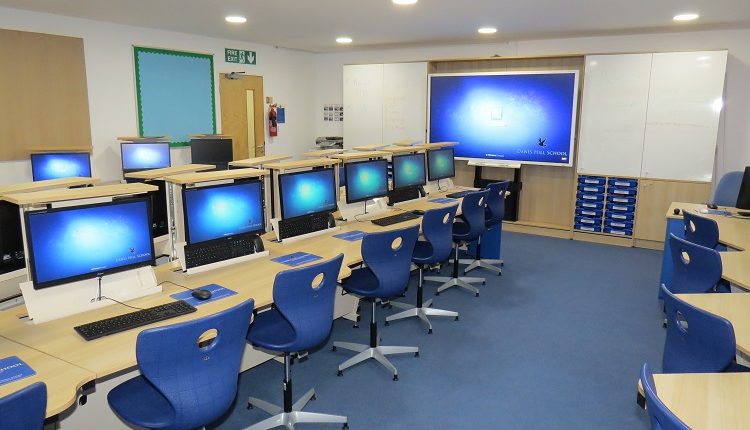(probably some countries, but not mine)
Outdated IT lessons
Nowadays, as the digital world’s impact is becoming impossible to ignore, more and more countries are introducing new educational frameworks for IT classes. It is crucial that the younger generations are being shown the opportunities that digital tools can provide or used to facilitate daily activities. I would like to point out to the issue of the core curricula in many primary and secondary schools and other educational establishments not being able to provide up-to-date knowledge in the classroom as fast as the development of the technological and virtual realm happens. Big companies are constantly working on new products, softwares and updates to sustain their market position. Especially now this development can be seen in the abilities of AI tools. There are many educational contents talking about its dangers when used irresponsibly, but demonizing and denial is not the solution. Even though it is hard to execute, adapting to these changes would be the most valuable.
Teachers are bad
Many educational establishments make students learn and memorize many things that they are not going to use later in life to that extent. In cases of other subjects than IT, there is not that much change happening throughout the years, so it is possible to build on the already obtained knowledge. However, trying to monitor the improvements and applying accurate developments to core curricula of IT classes would be more difficult. Both because of legal reasons of introducing them, and in terms of the teaching staff. Teachers would have to continuously educate themselves to adapt, which may generate additional costs or cause shortage in qualified educators.
I can’t imagine my past IT teachers
- strict woman who would scream instead of talk, her only rule was giving the lowest grade possible for each unnecessary space put in any text we would work on, both as a partial grade and the grade for the task (so now I always check my spaces)
- a man who just wanted the whole class to be quiet and do the exercises from the book, “any questions? yes? read the book.” (didn’t teach me much)
- also strict and demanding teacher, who wanted us to have a physical NOTEBOOK with NOTES (that she would check for a grade) from IT class, she didn’t bother to pronounce “Shift” or other computer specific words in English, just read it phonetically as if it was written in our first language
having to teach children something that would include “modern technology”, or educating themselves further in order to conduct a valuable lesson for the youngest generation. I may not have the best experience with those teachers, and though I believe that there are many dedicated educators, I assume that this dedication can fade over the years because of exhaustion or other personal reasons.

Computers? Computers are also bad
Many public educational institutions struggle with financing. Therefore, it is sometimes impossible or just difficult to have a sufficient number of computers and other devices in the computer lab. Sometimes, more than one student had to work with one device, which consequently contributed to not all pupils having the same learning experience. Even if there are enough computers for all students in the class, they tend to be slow or function on outdated software. This hinders the knowledge from school to be applied in other settings when the level of technical development varies. In turn, it makes students think of that class as a separate realm from their everyday digital encounters.

Outcomes are bad
At the end of the day, many students have to learn a lot of things connected with the digital activity on their own, either by experimenting or sourcing the information online. If they are already spending so much time at school, why couldn’t they learn something valuable and useful? They are usually treating IT class as just another subject they have to attend in order to finish some level of education. However, in reality it could provide them with skills that they could develop for their own use, such as basic editing and programming or impeccable command of Microsoft 365 or even AI powered tools.

The educational system makes students mostly care about grades, so making the classroom more open and approachable (rather than a system of tasks and marks) could cause some issues in the motivational respect. However, offering them useful knowledge might change their perspective. From the formal point of view it would be difficult to keep up with the continuous changes, or grade the students on their performance in class, but not impossible. In general, people don’t like adapting to changes, but I believe that departing from the strict approach to teaching by slowly introducing new topics and tools or open discussions, especially in such a flexible field, would be a great start.
*In this post I mainly focus on primary and secondary education levels, because the way of conducting these lessons builds the inaccurate idea of this subject being useless. This leaves a huge gap and false perception of this matter when comparing with the curriculum in higher education, that engages with those topics on a deeper and more contemporary (but also different) level and approach, and therefore the issues described above are not as major.
Image sources
Image 1
Image 2
Image 3



I could not agree more with your post! I have this conversation with my older sister all the time. We both went to the same school, years apart, and compare the IT eductaion we received. There is definitely a decline in teaching quality as the years go on. We’ve always said we think it is because teachers expect children who grew up in the generation of home computers being common and laptops being common to automatically know how to do everything so they teach them less in school. So your post was a very interesting read which reassured me that me and my sister aren’t the only people who think the quality of IT lessons is terrible.